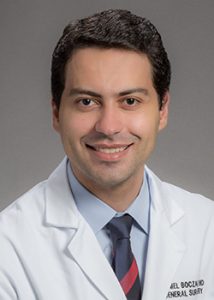Boczar, Daniel
Daniel Boczar, MD

Hometown:
Salvador, Bahia, Brazil
Medical School:
Faculdade de Tecnologia e Ciencias, Brazil
Bio:
I was born and raised in Salvador Bahia, the third largest city in Brazil. I always wanted to be a physician like my father. I was accepted into medical school at age of 17 and have been interested in surgery ever since. In exploring my interest, I patented a suture simulator and started a company that was featured in the Brazilian Forbes under 30 list and has helped Brazilian medical students improve their suture skills. I was fortunate enough to do research fellowships at Mayo Clinic FL and NYU. Some examples of my work include a virtual assistant for breast cancer patients and a smartphone app that quantifies recovery of facial palsy patients. I stepped out of my comfort zone in Brazil seeking world-class surgical training and UW has everything I wanted to experience as a surgical trainee, in addition to a unique spirit of collegiality and camaraderie.
Personal Interests:
Entrepreneurship, learning new skills, spending time with friends, and learning about other people’s cultures.
Clinical Interests:
Trauma surgery
Transplant
Reconstructive surgery
Professional Activities:
American College of Surgeons
Brazilian College of Surgeons
Plastic Surgery Research Council
Why UW?
I feel grateful for the opportunity to be here. Our program has offered world-class surgical training since 1947. It has an unmatched volume and range of pathology due to the large geographic area that it serves. The faculty is committed to surgical education, and there is a strong culture of excellence and camaraderie.
What advice do you have for incoming interns?
Fully embrace the experience of being a surgical trainee. Take advantage of every opportunity to learn and pay attention to ways of being a useful resource for your colleagues.
Publications:
Boczar D, Restrepo DJ, Sisti A, et al. Disparity on Unplanned Readmission in Melanoma Patients: A National Cancer Database Analysis. Anticancer Res. 2019;39(12):6877-6880.
Restrepo DJ, Sisti A, Boczar D, et al. Characteristics of Breast Cancer Patients Who Refuse Surgery. Anticancer Res. 2019;39(9):4941-4945.
Boczar D, Huayllani MT, Forte AJ, Rinker B. Microsurgical Breast Reconstruction in the Obese Patient Using Abdominal Flaps: Complication Profile and Patient Satisfaction. Ann Plast Surg. 2020;84(6S Suppl 5):S361-s363.
Boczar D, Sisti A, Oliver JD, et al. Artificial Intelligent Virtual Assistant for Plastic Surgery Patient’s Frequently Asked Questions: A Pilot Study. Ann Plast Surg. 2020;84(4):e16-e21.
Boczar D, Avila FR, Carter RE, et al. Using Facial Recognition Tools for Health Assessment. Plast Surg Nurs. 2021;41(4):232-236.
Boczar D, Bagaria SP, Spaulding AC, et al. Treatment Contraindications Based on Comorbidity Status in Patients With Melanoma in the United States. Anticancer Res. 2021;41(4):2067-2070.
Boczar D, Brydges H, Rodriguez Colon R, et al. Quantification of Facial Allograft Edema During Acute Rejection: A Software-Based 3-Dimensional Analysis. Ann Plast Surg. 2022;89(3):326-330.
Boczar D, Colon RR, Berman ZP, et al. Measurements of motor functional outcomes in facial transplantation: A systematic review. J Plast Reconstr Aesthet Surg. 2022;75(9):3309-3321.
Boczar D, Rodriguez Colon R, Chaya BF, Trilles J, Rodriguez ED. Using Artificial Intelligence to Measure Facial Expression following Facial Reanimation Surgery. Plast Reconstr Surg. 2022;149(3):593e-594e.
Full list: Pubmed “boczar d”
